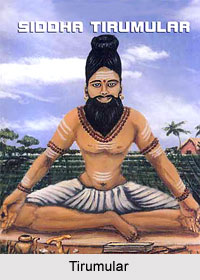 Tirumular or Thirumoolar, was Tamil Shaivite sage and poet who was originally known as Sundaranatha. He was considered as one of the 63 Nayanars (Shaivite devotee) and one of the 18 Siddhars. In the 5th CE, Tirumular wrote Tirumantiram (Tirumandhiram) which is a devotional poetic work of Tamil literature. It comprises of almost three thousand verses and is amongst the major texts of the Tamil Shaiva Siddhanta, known as the Tirumurai. According to legends, Tirumular was a scholar and a Shaivite saint who traveled from Kailash and used his yogic abilities to transmigrate into the body of Mulan, a cowherd. It is believed that Tirumular awoke from his trance only once in a year and wrote one poetry until he obtained salvation.
Tirumular or Thirumoolar, was Tamil Shaivite sage and poet who was originally known as Sundaranatha. He was considered as one of the 63 Nayanars (Shaivite devotee) and one of the 18 Siddhars. In the 5th CE, Tirumular wrote Tirumantiram (Tirumandhiram) which is a devotional poetic work of Tamil literature. It comprises of almost three thousand verses and is amongst the major texts of the Tamil Shaiva Siddhanta, known as the Tirumurai. According to legends, Tirumular was a scholar and a Shaivite saint who traveled from Kailash and used his yogic abilities to transmigrate into the body of Mulan, a cowherd. It is believed that Tirumular awoke from his trance only once in a year and wrote one poetry until he obtained salvation.
Life of Tirumular
The period of Tirumular existence is much debated as his poetic work makes many references of various currents of religious thought. Different scholars allocate different dates. It is claimed in verse 74 of the Tirumantiram that before composing the Tirumantiram, the Shaiva poet lived for 7 yugas (aeons). Therefore, some scholars place his composition much before the Common Era. But according to scholar S. Vaiyapuripillai, Tirumular lived during the early 8th century AD, as he uses reference of the Tevaram hymns of Sambandar, Appar and Sundarar. Moreover in his poetic work of Tirumantiram, Tirumular used much later words and also mentioned about the weekdays. According to others Tirumular existed during the 11th or 12th century AD.
Philosophy of Tirumular
Tirumular emerges as a moral philosopher and teaches the ethics of non-violence (ahimsa), abstinence from meat, alcohol and others. In his much celebrated poetic work known as Tirumantiram, Tirumular gave emphasis to the concept Love is God (Anbey Sivam) and those who have this knowledge are enlightened and acquire the traits of godliness. In another verse, he proceeds from the recognized reality of love to an unidentified reality of God. He concludes that there is no difference between love and God. In another verse Tirumular denounces the strict austerities which are practiced by the devotees of Lord Shiva. Tirumular urges that service to humans is more imperative than the worship of gods in temples with offerings. He denounces the desire of one man for another man`s wife, but also states that love is God. Moreover, Tirumular states about the unity of man and God and stresses on the attainment of knowledge. He also believes God created both good and evil forces and it is upto the judgment of mankind to choose the correct one.
The three thousand verses written in Tirumantiram by Tirumular in the viruttam metre discloses many exceptional truths. Tirumular implements allegorical language to describe that human can attain realisation of God by disciplining the 5 senses. It is more important to analyse the inner mind that to scrutinize the external world. It is rather imperative to choose from the many noble things to lead a good life. Tirumular effortlessly expressed the eternal truth that man can only see the transitory nature of life after his eyes are opened by death. Tirumantiram is written in a range of rhythm that depends on the pace of his ideas.



















